 The first volume to be published in the new Essentials of Biblical Greek Grammar series is Voice and Mood: A Linguistic Approach, by David L. Mathewson (Baker Academic, 2021). The author is associate professor of New Testament at Denver Seminary. As expected, the book is divided into two parts, voice and mood, each with three chapters, all sandwiched between a brief but valuable introduction and conclusion. The book also contains a bibliography and author, Scripture, and subject indexes. Every part of the book is interesting and informative. The writing is crisp and clear. The highlight of the first part is the discussions of the middle voice, deponency, and the relationship between the middle and passive voices. The highlight of the second part is the discussion of the imperative mood. The author is a master of his subject. The book is essential for serious study of the Greek voices and moods, and serves as a corrective to erroneous and incomplete information found in older grammars of New Testament Greek.
The first volume to be published in the new Essentials of Biblical Greek Grammar series is Voice and Mood: A Linguistic Approach, by David L. Mathewson (Baker Academic, 2021). The author is associate professor of New Testament at Denver Seminary. As expected, the book is divided into two parts, voice and mood, each with three chapters, all sandwiched between a brief but valuable introduction and conclusion. The book also contains a bibliography and author, Scripture, and subject indexes. Every part of the book is interesting and informative. The writing is crisp and clear. The highlight of the first part is the discussions of the middle voice, deponency, and the relationship between the middle and passive voices. The highlight of the second part is the discussion of the imperative mood. The author is a master of his subject. The book is essential for serious study of the Greek voices and moods, and serves as a corrective to erroneous and incomplete information found in older grammars of New Testament Greek.
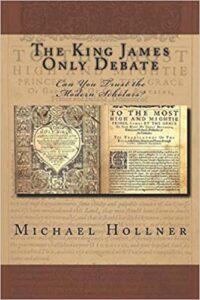 (Read part 1, part 2, part 3, part 4, part 5, part 6, part 7) I must bring this review to a close. In the other parts of this review, I have covered the introductory material and chapters 1-4, 14, & 15. Hollner laments that some critics have not read his entire book through and “still leave it bad reviews” (p. 324). I can understand why. Anyone with any sense who read just one of the chapters that I have reviewed thus far would be justified in leaving a bad review. To be fair to the author, I have read the entire book through. And it is for that reason that I must say that The King James Only Debate is the worst book I have ever read when it comes to errors of fact, grammatical errors, layout, and formatting errors. Chapters 5-13 are not as bad as the rest of the book, so I will not comment on each of these chapters individually. They are, however, still written in the usual Hollner bombastic style that makes them painful to read. Anything of value in these chapters could be condensed by about 80 percent. I can’t resist, though, in pointing out this ridiculous statement from chapter 9: “If we received a love offering of twenty dollars for every so-called contradiction in the King James Bible that we cleared up, we could have a room full of twenty-dollar bills” (p. 276). I couldn’t help but think, who would write this guy about anything? The King James Only Debate is a disgrace and embarrassment to our cause. It is a horrible book that can only drive curious people away from the King James Bible. The author should immediately apologize for writing such a piece of garbage, take it off the market, destroy his inventory of the book, and go into hiding. The book is that bad. There is nothing in it that is “good” that cannot be found in other books in defense of the King James Bible.
(Read part 1, part 2, part 3, part 4, part 5, part 6, part 7) I must bring this review to a close. In the other parts of this review, I have covered the introductory material and chapters 1-4, 14, & 15. Hollner laments that some critics have not read his entire book through and “still leave it bad reviews” (p. 324). I can understand why. Anyone with any sense who read just one of the chapters that I have reviewed thus far would be justified in leaving a bad review. To be fair to the author, I have read the entire book through. And it is for that reason that I must say that The King James Only Debate is the worst book I have ever read when it comes to errors of fact, grammatical errors, layout, and formatting errors. Chapters 5-13 are not as bad as the rest of the book, so I will not comment on each of these chapters individually. They are, however, still written in the usual Hollner bombastic style that makes them painful to read. Anything of value in these chapters could be condensed by about 80 percent. I can’t resist, though, in pointing out this ridiculous statement from chapter 9: “If we received a love offering of twenty dollars for every so-called contradiction in the King James Bible that we cleared up, we could have a room full of twenty-dollar bills” (p. 276). I couldn’t help but think, who would write this guy about anything? The King James Only Debate is a disgrace and embarrassment to our cause. It is a horrible book that can only drive curious people away from the King James Bible. The author should immediately apologize for writing such a piece of garbage, take it off the market, destroy his inventory of the book, and go into hiding. The book is that bad. There is nothing in it that is “good” that cannot be found in other books in defense of the King James Bible.
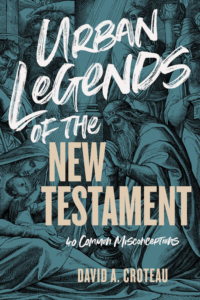 Surely the Bible is the most misinterpreted book, and even Christians are not immune from misconstruing and misunderstanding many passages. This is why I like this series on urban legends from B&H Academic. In Urban Legends of the New Testament (2015), David Croteau, surveys forty of the most commonly misinterpreted passages in the New Testament. In Urban Legends of the Old Testament (2019), David Croteau and Gary Yates
Surely the Bible is the most misinterpreted book, and even Christians are not immune from misconstruing and misunderstanding many passages. This is why I like this series on urban legends from B&H Academic. In Urban Legends of the New Testament (2015), David Croteau, surveys forty of the most commonly misinterpreted passages in the New Testament. In Urban Legends of the Old Testament (2019), David Croteau and Gary Yates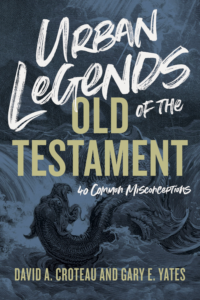 survey forty of the most commonly misinterpreted passages in the Old Testament. Each legendary teaching is introduced with a Bible verse and a paragraph followed by several pages of unraveling (NT) or countering (OT) the legend. Each brief chapter concludes with an application and an annotated bibliography. I like the format of these volumes even if I don’t like all of the authors’ explanations, and
survey forty of the most commonly misinterpreted passages in the Old Testament. Each legendary teaching is introduced with a Bible verse and a paragraph followed by several pages of unraveling (NT) or countering (OT) the legend. Each brief chapter concludes with an application and an annotated bibliography. I like the format of these volumes even if I don’t like all of the authors’ explanations, and
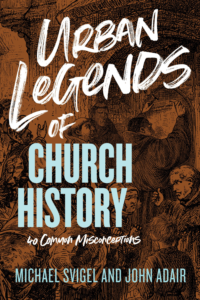 I certainly don’t. The newest volume (2020) in the series is Urban Legends of Church History. It surveys forty of the most commonly misunderstood events of church history, from the period of the early church through the modern age. I recommend these books, with some reservations, of course, and look forward to more volumes in the series.
I certainly don’t. The newest volume (2020) in the series is Urban Legends of Church History. It surveys forty of the most commonly misunderstood events of church history, from the period of the early church through the modern age. I recommend these books, with some reservations, of course, and look forward to more volumes in the series.
Someone asked me about middle knowledge after I made mention of the term in a recent post at The Preacher’s Library. I say on page 389 of my book The Other Side of Calvinism that middle knowledge is “knowledge of what will or could or would happen.” This is also called Molinism, after Luis de Molina (1535-1600), who taught that through God’s middle knowledge, “in virtue of the most profound and inscrutable comprehension of each faculty of free choice, He saw in His own essence what each such faculty would do with its innate freedom were it to be placed in this or in that or, indeed, in infinitely many orders of things—even though it would really be able, if its so willed, to do the opposite.”
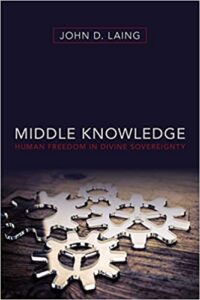 I was introduced to the term via William Lane Craig’s The Only Wise God: The Compatibility of Divine Foreknowledge and Human Freedom (Baker, 1987). The more recent and notable books on the subject of middle knowledge are, from a philosophical point of view, Molinism: The Contemporary Debate, edited by Ken Perszyk (Oxford, 2011). From the religious perspective there is Middle Knowledge: Human Freedom in Divine
I was introduced to the term via William Lane Craig’s The Only Wise God: The Compatibility of Divine Foreknowledge and Human Freedom (Baker, 1987). The more recent and notable books on the subject of middle knowledge are, from a philosophical point of view, Molinism: The Contemporary Debate, edited by Ken Perszyk (Oxford, 2011). From the religious perspective there is Middle Knowledge: Human Freedom in Divine  Sovereignty, by John D. Laing (Kregel, 2018). I recommend Luis de Molina: The Life and Theology of the Founder of Middle Knowledge, by Kirk R. MacGregor (Zondervan, 2018), and William Lane Craig’s contribution to Divine Foreknowledge: Four Views, edited by James Beilby and Paul R. Eddy (IVP Academic, 2001).
Sovereignty, by John D. Laing (Kregel, 2018). I recommend Luis de Molina: The Life and Theology of the Founder of Middle Knowledge, by Kirk R. MacGregor (Zondervan, 2018), and William Lane Craig’s contribution to Divine Foreknowledge: Four Views, edited by James Beilby and Paul R. Eddy (IVP Academic, 2001).
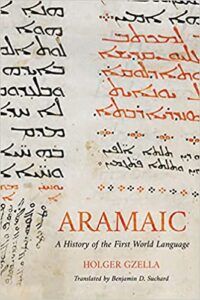 Although we commonly say that the Old Testament was written in Hebrew, we know that portions of Ezra and Daniel were written in Aramaic. We also know that there are a few Aramaic words in the New Testament (Abba, Cephas, Maranatha, etc.). Benjamin D. Suchard has translated Holger Gzella’s Aramaic: A History of the First World Language (2017) and Eerdmans has recently published it (2021). You may not be as into languages as I am, but I think this is a fascinating book. The most important chapter, of course, is chapter 4, “Aramaic in the Bible and Early Judaism.”
Although we commonly say that the Old Testament was written in Hebrew, we know that portions of Ezra and Daniel were written in Aramaic. We also know that there are a few Aramaic words in the New Testament (Abba, Cephas, Maranatha, etc.). Benjamin D. Suchard has translated Holger Gzella’s Aramaic: A History of the First World Language (2017) and Eerdmans has recently published it (2021). You may not be as into languages as I am, but I think this is a fascinating book. The most important chapter, of course, is chapter 4, “Aramaic in the Bible and Early Judaism.”
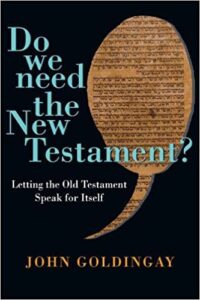 John Goldingay is an Anglican Old Testament scholar, and is the David Allan Hubbard Professor Emertius of Old Testament at Fuller Theological Seminary. I have his new commentary on Genesis (2020) in the Baker Commentary on the Old Testament Pentateuch series. I have his massive (1033 pages) new commentary on Jeremiah (2021) in The New International Commentary on the Old Testament series published by Eerdmans. I also have his volume on Daniel (1989) in the Word Biblical Commentary series, but it is not worth consulting, as will be evident by the end of this post.
John Goldingay is an Anglican Old Testament scholar, and is the David Allan Hubbard Professor Emertius of Old Testament at Fuller Theological Seminary. I have his new commentary on Genesis (2020) in the Baker Commentary on the Old Testament Pentateuch series. I have his massive (1033 pages) new commentary on Jeremiah (2021) in The New International Commentary on the Old Testament series published by Eerdmans. I also have his volume on Daniel (1989) in the Word Biblical Commentary series, but it is not worth consulting, as will be evident by the end of this post.
I recently read Goldingay’s book Do We Need the New Testament? Letting the Old Testament Speak for Itself (InterVarsity Press, 2015). The relationship between the Old and New Testaments is an area of special interest to me, and I have many books on this subject. Goldingay’s book is not one I will be keeping. Most of the chapters are based on papers given at theological conferences. I have heard many papers delivered at such conferences. I would certainly have slept through Goldingay’s. He maintains that there is little that is distinctive or unique about the New Testament. He dislikes the term “Old Testament,” and prefers “First Testament.” Because Goldingay is about as far from a dispensationalist as one can be, even though he is a revered Old Testament scholar, he really has no clue how to interpret the Old Testament. His book Do We Need the New Testament? shows us that he has no clue about how to interpret the New Testament either.
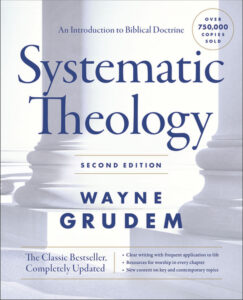 Zondervan recently published the second edition of Wayne Grudem’s Systematic Theology: An Introduction to Bible Doctrine. The first edition was published in 1994, and sold (according to the publisher) over 750,000 copies. This is a massive book of over 1,600 pages. Grudem, formerly of Trinity Evangelical Divinity School, is distinguished research professor of theology and biblical studies at Phoenix Seminary in Phoenix, Arizona, and author of many books. He holds degrees from Harvard, Westminster Seminary, and Cambridge.
Zondervan recently published the second edition of Wayne Grudem’s Systematic Theology: An Introduction to Bible Doctrine. The first edition was published in 1994, and sold (according to the publisher) over 750,000 copies. This is a massive book of over 1,600 pages. Grudem, formerly of Trinity Evangelical Divinity School, is distinguished research professor of theology and biblical studies at Phoenix Seminary in Phoenix, Arizona, and author of many books. He holds degrees from Harvard, Westminster Seminary, and Cambridge.
I want to focus on the differences between the first and second editions, which mainly consist of additional material. I am glad to see that the preface to the second edition has a list of the additional material, which increases the size of the book by “about 16 percent.” The additional material—some good and some bad—includes completely updated bibliographies, all Scripture quotations changed from RSV to ESV, additional discussion of specific “problem verses” for biblical inerrancy, a more extensive critique of open theism, a new discussion and critique of middle knowledge, an extensive discussion of Free Grace theology, a “completely revised, stronger chapter” on creation and evolution, a critique of the New Perspective on Paul and its view of justification, a contemporary worship song added at the end of each chapter, a critique of preterism, and the indexing of topics covered in twenty-one new systematic theology texts published since 1993.
Grudem is a Calvinist, hence his critique of middle knowledge and Free Grace theology. Grudem is very good on theistic evolution, but don’t let his “completely revised, stronger chapter” on creation and evolution fool you. Grudem says that he now believes in an earth and a universe that are billions of years old. Same for his critique of preterism. It is good, but Grudem is a historic premillennialist and rejects dispensationalism. The best change in the second edition is Grudem’s new defense of the translation of “only begotten” rather than “only” in John 3:16 and elsewhere (pgs. 293-296).
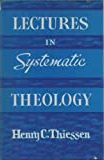 Since Grudem is a Baptist, Baptists in particular will want to read his chapters on church government and baptism. Back when I taught theology, I owned at least twenty books titled Systematic Theology. Which one is the best? Hard to say. Even though it is dated, I still recommend Lectures in Systematic Theology by Henry C. Thiessen (Eerdmans, 1949). It is Baptist, orthodox, dispensational, and premillennial. This was revised by Vernon D. Doerksen (Eerdmans, 1979), some of it rather extensively.
Since Grudem is a Baptist, Baptists in particular will want to read his chapters on church government and baptism. Back when I taught theology, I owned at least twenty books titled Systematic Theology. Which one is the best? Hard to say. Even though it is dated, I still recommend Lectures in Systematic Theology by Henry C. Thiessen (Eerdmans, 1949). It is Baptist, orthodox, dispensational, and premillennial. This was revised by Vernon D. Doerksen (Eerdmans, 1979), some of it rather extensively.